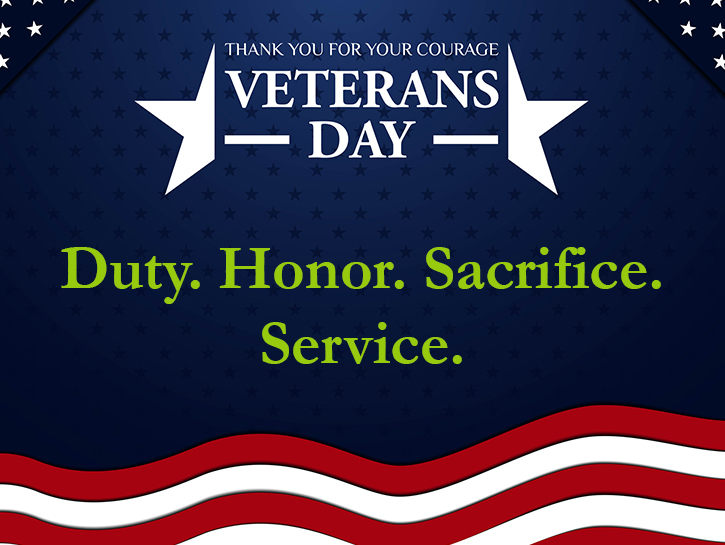

November 10, 2025
Veterans Day Reflections: Duty, Honor, Sacrifice and Building Your Team
In the pursuit of strategic growth and operational excellence, organizational resilience isn’t defined by financial statements alone. It’s built on human character and deep dedication to the mission. On Veterans Day, we honor the service members who embody these values daily, and we have an invaluable opportunity to put a spotlight on principles that forge the most reliable teams, within and outside the military.
The skills veterans bring—from front-line logistics to high-stakes strategic planning—are directly applicable to any business environment. Veterans possess a mastery of operational precision, accountability and adaptive leadership developed under the highest levels of pressure.
These are the bedrock of effective team management, low-attrition talent retention and the ability to execute complex initiatives. When businesses seek to build long-term capacity, they would do well to look for the same core qualities that transform individuals into a cohesive unit: loyalty to teammates and clarity of purpose.
On Duty: The Mission-Focused Mindset That Drives Teams
“Serving in the military helps me bring a mission-focused mindset,” says Ray Pereira, Vice President of Talent Acquisition & Development at ECLARO and a former United States Marine whose journey from military service to executive leadership offers timeless insights, “ensuring my teams are aligned around shared objectives and that everyone understands their role in achieving the objectives.”
Consistently leveraging this mindset in a role that is driven by aligning people around common goals isn’t confined to the structure of ranks and orders, Pereira notes. It translates seamlessly into the collaborative world of talent development. When helping individuals find not just jobs but fulfilling careers is at the heart of the work, he emphasizes listening deeply to uncover each person’s strengths and aspirations.
Such an approach goes a long way toward turning individual contributions into meaningful collective progress—and reminding us all that true commitment starts with showing up for one another. That matters on every team, with every role, in every organization. It drives a sense of duty that spreads beyond the confines of any office and inspires a sense of purpose in communities at large.
“ECLARO made a commitment to the Philippines to provide opportunities for Filipinos to grow their careers, change their lives and the lives of their families,” notes Pereira, who now calls Manila home. “ECLARO is focused on growth in the Philippines. In addition to our business, we believe in changing lives through education, the reason why we also have an educational arm, ECLARO Academy.”
On Honor: Cultivating Integrity and Trust in Every Interaction
The concept of honor, central to service, translates directly into a workplace culture defined by trust and ethical conduct.
“Honor in the military is about integrity, ethical conduct and earning the respect of peers and subordinates,” Pereira reflects. “I value honor and strive to build a culture of trust, where honesty and ethical behavior are expected and rewarded.”
This means more than policies on paper, he notes. It’s lived out in the everyday exchanges that define a workplace. Whether providing candid feedback during a performance review or navigating a challenging hiring decision, he prioritizes transparency and empathy.
Pereira sees honor as foundational to successful personal relationships. This can mean tough but kind conversations with a mentee facing a career crossroads or standing solidly with a colleague through times of uncertainty. In such moments, honor doesn’t just earn trust, it sparks it, creating a ripple effect of confidence that strengthens teams and communities alike.
RELATED: Honoring Valor, Remembering a Shared Past, Forging a United Future
On Sacrifice: Prioritizing the Greater Good for Lasting Impact
Perhaps the most defining principle learned through military service is sacrifice, the deliberate choice to prioritize the group over the individual. When applied to leadership decisions at any level, this can help transform teams across industries by changing the perspective of individuals in any role.
“Military service required me to make personal sacrifices,” Pereira says, “conditioning me to put the needs of the mission and team above my individual comfort or gain.”
When it becomes second nature in the workplace, it shows up in actions like one’s willingness to invest extra time mentoring emerging talent or helping a team member seize a growth opportunity. Yet, he stresses, sacrifice isn’t a burden. It’s a source of strength. It cultivates resilience, helping navigate setbacks like a stalled project or personal challenges, and reveals fulfillment in lifting others and helping them be their best.
Veterans Day is a natural time to pause and reflect on the ongoing impact that our veterans and their time in the military can have in the workplace and beyond. But the lessons and insights shared by Pereira and others remind us that every day is an opportunity to remember, reflect and realize the potential and power in every veteran’s experience.
“Duty, honor and sacrifice when carried from the military into my executive role fosters a mission-driven, loyal, ethical and resilient leadership style that benefits both my people and our organizational performance,” Pereira says.
These aren’t relics of the past, he notes, but living tools available to anyone committed to leading with intention and heart. These are the tools of the Right People.
